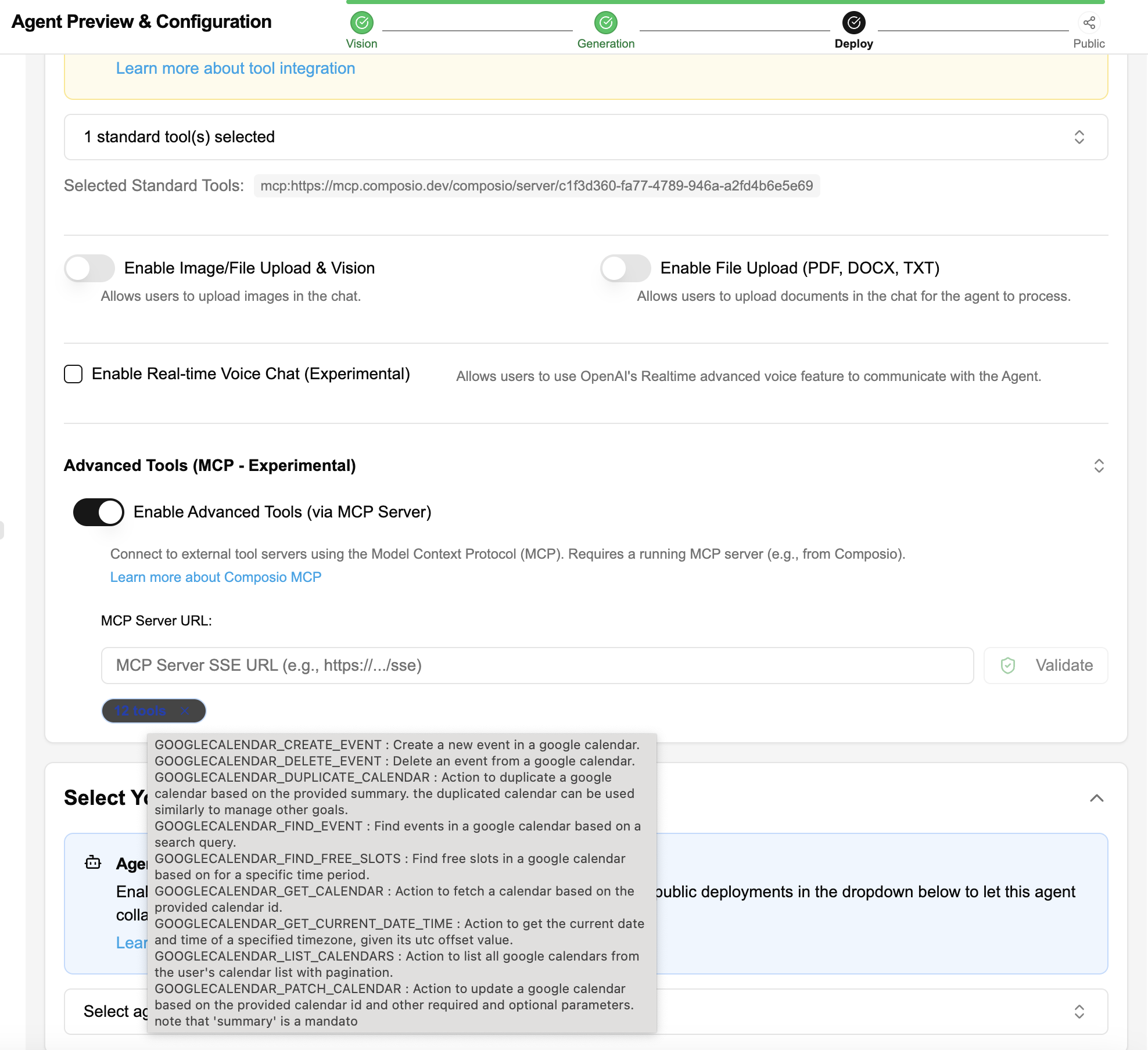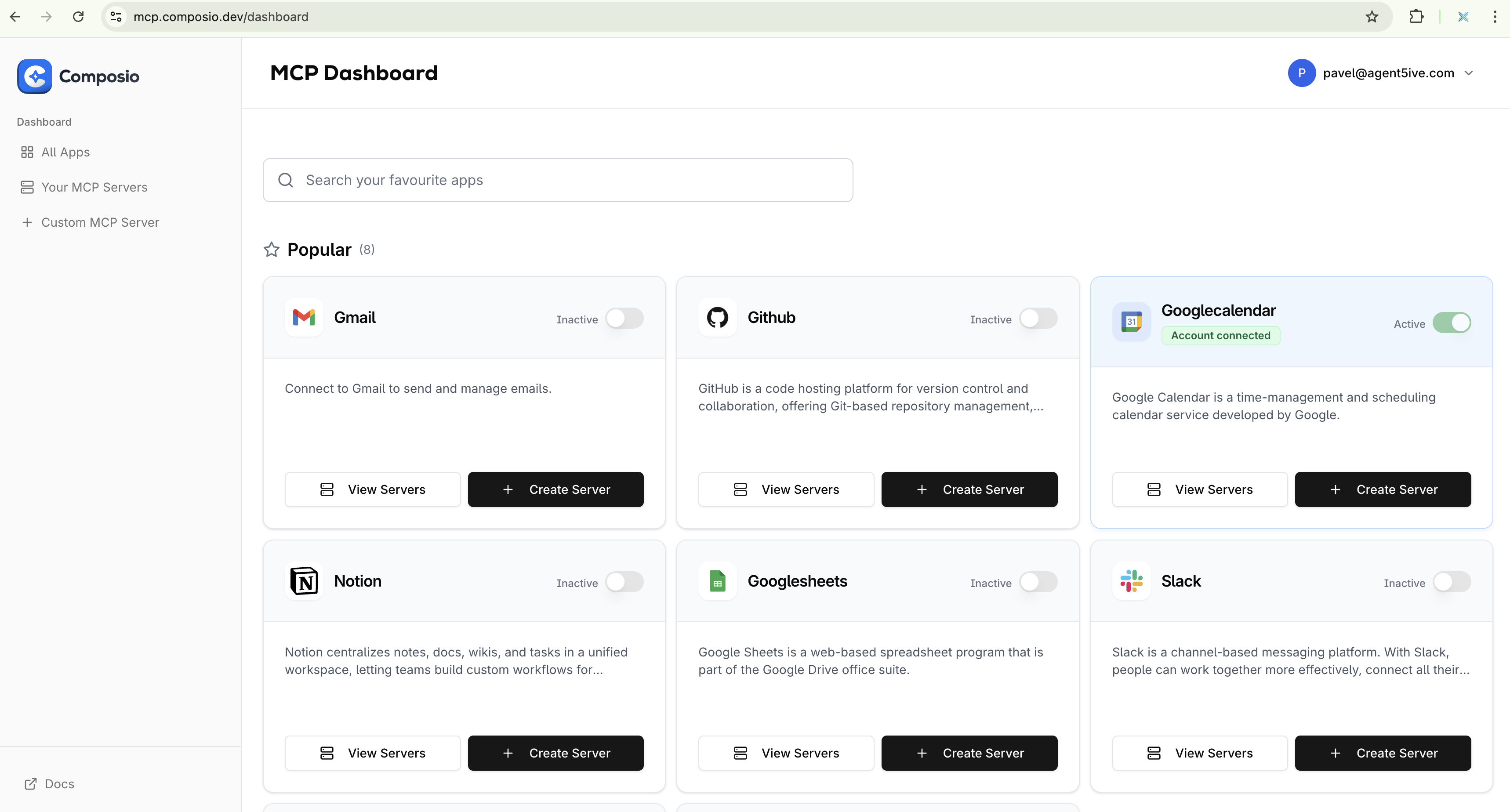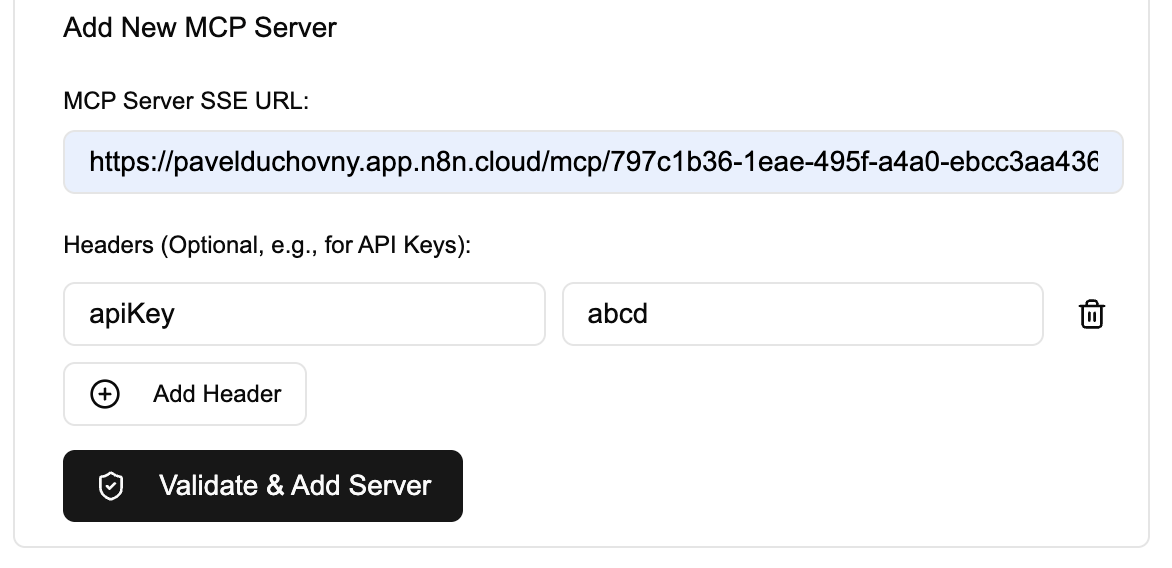MCP Integration Guide
Learn how to integrate Agent5ive with the Multi-Channel Platform (MCP).
Composio tools now support automatic authentication directly through Agent5ive! When you add a Composio MCP server during agent creation or editing, a popup will automatically handle authentication with the needed API keys and OAuth flows.
How it works:
- Add a Composio MCP server during agent creation or editing
- A popup will appear to guide you through authentication
- Complete the auth flow and close the authentication window
- The Advanced MCP server will be automatically added to your agent
If auto-authentication fails: You'll receive a guide to use the traditional manual setup method described below in this documentation.
What is MCP?
The Model Context Protocol (MCP) is a standardized way for language models to interact with external tools and services. It allows AI agents to access and use capabilities beyond their built-in knowledge, such as retrieving real-time data, interacting with APIs, or performing actions in external systems.
In Agent5ive, MCP integration enables your agents to connect to external Server-Sent Events (SSE) hosted servers, such as those provided by Composio, giving them access to a wide range of third-party services like Google Calendar, Gmail, GitHub, and more.
How It Works
The Advanced Tools (MCP) feature in Agent5ive works by establishing a connection between your agent and an MCP server that exposes various tools and capabilities. Here's the process:
- MCP Server Setup - You create and configure an MCP server using a platform like Composio, which handles the authentication and connection to third-party services
- Agent Configuration - During agent creation in Agent5ive, you enable Advanced Tools (MCP) and provide the URL of your MCP server
- Validation - Agent5ive validates the connection to the MCP server and discovers the available tools
- Tool Integration - The discovered tools are made available to your agent
- Runtime Usage - When interacting with users, your agent can use these tools to perform actions or retrieve information from the connected services

Advanced Tools (MCP) configuration in Agent5ive
Getting Started with Composio MCP
Composio is a platform that simplifies the creation and hosting of MCP servers that can be connected to your Agent5ive agents. Follow these steps to set up your first MCP integration:
Visit the Composio MCP Dashboard and create an account or sign in with your existing credentials.

Composio MCP Dashboard showing available integrations
Browse the available integrations and select the one you want to use with your agent. Click the "Create Server" button for your chosen integration.
- Select the integration you want to use (e.g., Google Calendar, Gmail, GitHub)
- Configure the authentication settings as required by the service
- Grant the necessary permissions for the integration to work
- Complete the setup process
Once created, your MCP server will be assigned a unique URL that you'll use to connect it to your Agent5ive agent.
During the agent creation process in Agent5ive:
- Expand the "Advanced Tools (MCP)" section
- Toggle on "Enable Advanced Tools (via MCP Server)"
- Enter the MCP Server URL provided by Composio
- If your MCP server requires authentication, add the necessary headers (e.g., API key)
- Click the "Validate" button to verify the connection
If the validation is successful, you'll see a list of the tools available through the MCP server. These tools will now be available to your agent during conversations with users.

MCP Server configuration with authentication headers
After deploying your agent, test the MCP integration by asking the agent to perform tasks that require the connected tools.
Example Prompts for Google Calendar Integration:
- "Create a meeting with John tomorrow at 2 PM"
- "What's my schedule for next week?"
- "Move my 3 PM meeting to 4 PM"
- "Cancel my appointment on Friday"
Your agent should be able to use the MCP tools to perform these actions in the connected service.
Available MCP Integrations
Composio offers a variety of integrations that you can use with your Agent5ive agents. Some of the popular integrations include:
Create, view, update, and delete calendar events. Manage schedules and appointments.
Send and read emails, manage drafts, and organize your inbox.
Manage repositories, issues, pull requests, and code reviews.
Read, write, and manipulate spreadsheet data.
Create and manage pages, databases, and content in your Notion workspace.
Send messages, manage channels, and interact with your Slack workspace.
For detailed documentation on creating and configuring MCP servers, visit the tutorials page.
Best Practices
- Test your MCP integration thoroughly before deploying to production
- Use clear and specific instructions in your agent's system prompt about when to use MCP tools
- Monitor your integration for any authentication or permission issues
- Keep your MCP server and connected services up to date
- Implement proper error handling in your agent's responses for when tools fail
- Don't share sensitive MCP server URLs or credentials
- Avoid connecting to services with highly sensitive data without proper security measures
- Avoid creating complex tool chains that might confuse the agent
- Don't forget to inform users about what external services your agent can access
Troubleshooting
Validation Fails
If the MCP server validation fails, check:
- The URL is correct and includes the full path
- The MCP server is running and accessible
- Any authentication tokens or credentials are valid
- Network connectivity between Agent5ive and the MCP server
- If using authentication, verify that the correct header names and values are provided
Tools Not Working
If the agent can't use the MCP tools properly:
- Check that the tools are properly exposed by the MCP server
- Verify that the necessary permissions are granted
- Ensure the agent's system prompt includes instructions on using these tools
- Test with simple, clear requests before trying complex ones
Authentication Issues
If you encounter authentication problems:
- Refresh the authentication tokens in Composio
- Check if the service requires re-authentication after a certain period
- Verify that the correct scopes and permissions are requested during authentication
Frequently Asked Questions
Is MCP integration available on all Agent5ive plans?
Yes, the Advanced Tools (MCP) feature is available on all plans.
Can I create my own MCP server without using Composio?
Yes, you can create your own MCP server that follows the Model Context Protocol specification. However, Composio provides a simplified way to create and manage MCP servers with pre-built integrations.
How secure is the MCP integration?
The security of the MCP integration depends on both the MCP server implementation and the services it connects to. You can enhance security by using authentication headers with your MCP server. Composio and other MCP providers implement security best practices, but you should always review the permissions and data access granted to any integration.
Can I use multiple MCP servers with one agent?
Yes, you can connect as many MCP servers as you like to an agent. However, it's highly not recommended to connect more than the minimum needed to allow better performance and context optimization of agents. Each additional MCP server increases the complexity of the agent's context and can impact response times and accuracy.
Will MCP integration work with voice conversations?
Yes, MCP tools can be used in both text and voice conversations, unlike multi-agent tools which are limited to text conversations only.